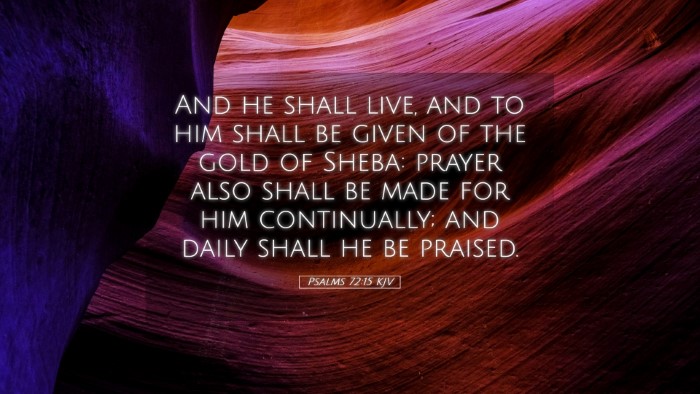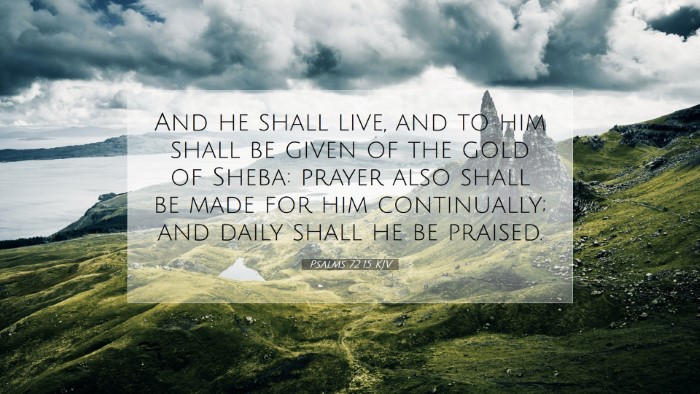Psalm 72:15: "And he shall live; and to him shall be given of the gold of Sheba: prayer also shall be made for him continually; and daily shall he be praised."
Commentary Overview
This psalm is attributed to Solomon and is often understood as a royal psalm that expresses the desires of a king for his reign and attributes divine blessings upon the king who is to come. The context and implications of Psalm 72:15 reflect the anticipation of the Messiah, heralding the virtues of peace, righteousness, and universal worship.
Insights from Matthew Henry
Matthew Henry emphasizes the intercessory aspect of this verse. He notes that it illustrates the significance of prayer in establishing a king's reign and highlights that daily prayers and tributes reflect the collective acknowledgment of a ruler's divine legitimacy. Henry posits that the reference to the gold of Sheba symbolizes not merely material wealth but also the nations' homage and recognition of the king's greatness.
- Gold of Sheba: Represents both wealth and the tribute owed to one recognized as worthy of honor and praise.
- Continuous Prayer: Indicates the responsibility of both the people and the king to remain in communion with God, showcasing the unity between divine authority and earthly responsibility.
- Praise and Worship: Suggests a culture of honor, where the ruler is continually uplifted in the hearts and mouths of the people.
Albert Barnes' Exposition
Barnes connects this verse with the broader theme of the messianic hope. He notes that the king referred to here is not Solomon but rather a prophetic anticipation of a future king, representing Christ, who will bring peace to the earth. He states that the receiving of gold alludes to the gifts presented to Jesus by the Magi, indicating the recognition of His true kingship.
- Messianic Prophecy: Barnes argues that the verse serves as a foreshadowing of the reverence and gifts that would be accorded to the Messiah.
- Universal Recognition: The tribute of gold and continual prayer symbolizes an understanding that all nations will eventually turn to, worship, and serve Christ.
- Divine Endorsement: The emphasis on prayer suggests a recognition that authority is ultimately derived from God and is sustained by divine intervention.
Contributions from Adam Clarke
Clarke offers a detailed analysis of the cultural and historical significance of the king being served with gold, complementing the ideas of devotion and wealth. He provides insights into the rituals of ancient nations that contributed to the recognition of kings. Clarke expands on the love of prayer, insisting that it creates an environment where divine blessing flows to the king and the nation alike.
- Cultural Practices: The gifting of gold presents an understanding of political relationships and the importance of securing divine favor through offerings.
- Prayer as Power: Clarke stresses that the vitality of a king's rule is interlinked with the spiritual state of the people, directly affecting the nation’s welfare.
- Praise as a Collective Duty: He advocates that the act of praising the king reflects a healthy societal structure where both leader and people find their roles in God’s providential plan.
Theological Implications
This verse has substantial implications for understanding the nature of Christ's kingship. It emphasizes that Jesus, as the ultimate King, receives honor from all nations. The continuous prayer and praise highlight the necessity of divine communion in governance and leadership, reflecting a model for contemporary Christian leaders. The presence of foreign tribute signals a breaking down of barriers as all of creation recognizes the sovereignty of the King.
- Kingdom Theology: The text mirrors the establishment of God’s kingdom through Christ, who is both a priest and a king, thereby reinforcing the concept of divine right.
- Role of Prayer in Leadership: The assertion that prayer is continual acknowledges the necessity of dependence on God for wisdom, guidance, and strength in leadership.
- Universal Worship: Strongly reinforces the idea of God's desire for worshippers from every tribe, tongue, and nation, a theme that resonates throughout the New Testament.
Practical Application for Modern Believers
This verse serves as a robust reminder for contemporary Christians about the importance of intercession for leaders. For pastors and spiritual leaders, it stresses the need for maintaining an active prayer life, both personally and corporately. The glorious expectation of daily praise challenges believers to cultivate a lifestyle of worship that acknowledges God's sovereign authority in all aspects of life.
- Prayer Initiatives: Encouraging church communities to initiate daily prayers for leaders and the nation as a whole.
- Worship Cultivation: Fostering environments where praise is not just a weekly ritual but a daily act of devotion that flows naturally from a heart aligned with God.
- Recognition of Christ’s Lordship: Teaching about the nature of Christ’s kingship and the importance of honoring Him in every sphere of life.


